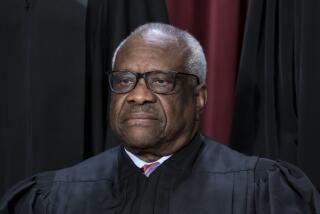Sununu Repays U.S. for Personal Travel : Ethics: More than $4,000 is reimbursed as a report criticizes both the former chief of staff and Bush’s counsel.
- Share via
WASHINGTON — John H. Sununu has reimbursed the government $4,242.80 for personal use of Air Force jets and government cars during his three-year tenure as White House chief of staff, the White House said Tuesday, as the Office of Government Ethics ended a yearlong investigation.
Besides sharply criticizing Sununu, the report found fault with White House counsel C. Boyden Gray’s handling of the matter after President Bush asked him to investigate the use of government transportation for personal and political occasions and to establish a policy for such travel by White House aides.
The disclosures were made as the White House appeared to have begun cooperating with a House Post Office subcommittee investigating the perquisites accorded members of the executive branch. Deputy Press Secretary Judy Smith said that the White House would dispatch an aide to testify before the panel later this week, after refusing the subcommittee’s request last week.
Sununu, governor of New Hampshire when Bush appointed him White House chief of staff in 1989, stepped down from his post in December. His departure followed Bush’s autumn slide in public opinion polls and revelations last spring that Sununu repeatedly had used small passenger jets from the Air Force fleet at Andrews Air Force Base for such personal trips as visits to his dentist in Boston and ski vacations in New Hampshire and Colorado.
“The cost to the government for the trips made by the governor during this period has been significant,” the ethics report said. Covered in the reimbursement were three trips aboard government airplanes and 11 by automobile, and one dinner for which charges to the government were rejected by the ethics office.
Sununu, it said, “should have been aware of the importance of separating the official and the political” elements of his travel, and the failure to do so was “significant.”
In the report, dated March 23, Stephen D. Potts, director of the Office of Government Ethics, criticized Sununu for gaining advance authorization for only 14 of 76 trips, and said that Sununu reclassified several trips as personal, rather than official, after reports of those trips were made public.
He also criticized poor record-keeping by Sununu’s office.
Studying trip after trip on Sununu’s travel logs, the report took exception not only to his efforts to characterize many as official but to Gray’s support for such efforts.
Gray, in a written response as lengthy as the ethics report, challenged some of the findings.
For instance, the ethics report said that a Sununu trip to California to attend Pete Wilson’s inauguration as governor in January, 1991, “should properly be characterized as political.”
But Gray argued that only 26% of Sununu’s visit to Sacramento was political and the rest was linked to official duties. Thus, only that portion of the $1,398 fare was billed to the Republican National Committee for reimbursement to the Air Force.
The reimbursements paid by the Republicans or by Sununu were based on commercial fares for routes flown on the Air Force jets. However, the cost of operating the aircraft exceeds by thousands of dollars the amount paid by the former official.
On the occasions when Sununu used government automobiles in New York, Boston and New Hampshire, accompanied by a government employee as driver, he was charged the approximate rate for renting a car in each region and an hourly rate based on average salaries for low-level government civilian or military personnel.
Sununu argued a year ago when the matter first surfaced that an executive order issued in 1987 by then-President Ronald Reagan required him to use the Air Force planes so that he could maintain secure communication with the White House.
But the ethics report challenged this argument, saying: “The policy allowed him to use the aircraft when appropriate and make whatever reimbursements were necessary, but it did not require him to use it for all purposes.”
Congress’ General Accounting Office, meanwhile, reported that executive branch officials took 43 trips between January, 1989, and March, 1991, that did not involve government business. The trips cost $774,330, with the government reimbursed $61,585 by the officials and taxpayers paying the rest.
In a study of 222 trips taken by 11 officials, GAO also found that 28 trips combined political or personal business with government business. GAO named Secretary of State James A. Baker III and Sununu as the two travelers who cost taxpayers the most. It said that 10 of the officials reviewed generally followed Administration policy but that Sununu did not. Three officials--former Atty. Gen. Dick Thornburgh, former Labor Secretary Elizabeth Hanford Dole and U.S. Trade Representative Carla Anderson Hills--traveled only on official business.
After a report that Baker’s personal trips had cost taxpayers more than $300,000, the secretary said last week that he would take commercial flights to cut costs, where possible.
More to Read
Sign up for Essential California
The most important California stories and recommendations in your inbox every morning.
You may occasionally receive promotional content from the Los Angeles Times.













